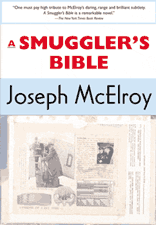

|
A Smuggler's Bibleby Joseph McElroy Edition History:
|
|
Used once upon a time to convey contraband , the familiar hollowed-out bible reappears transformed as A Smuggler’s Bible. It proves to be a conveyer of lives, a narrative marked by the omnidirectional texture of modern life. It is also an open-ended metaphor for the earnest, perhaps at times futile but engrossing attempt by David Brooke to project his life into the lives of others who have left in him puzzlement, fascination, darkness, light, profit, frustration, and perhaps damage. Thus is David the reader of his own life, in these eight manuscripts of his brought aboard a transatlantic ship to be made sense of during the crossing and delivered to a mysterious old man in London. As David broods over these words, these people – the bizarre tenants of a Manhattan rooming house, a reserved English bookseller in Brooklyn Heights, a mercurial professor of history in New England, David’s mother on a day of haunting and palpable insight, and his own father seen from surprisingly developing angles facing death and life – a cunning interlocutor emerges in new interchapters who is a division of David himself to shape and thwart patterns of meaning in the profuse details of life. All told, an obsessive, vexing, and sometimes droll effort to connect the parts of himself and hold them together. |
|
Reviews for A Smuggler's Bible |
|
|
Christina Hobhouse London Times, 1968, ...There is tremendous skill in the way David is made to write himself into other people's histories. The novel wraps itself round the reader like a skin, and we forget that their stories are coloured by his "self-projection," that David writes their stories for them, and that McElroy writes David's story for him. The acid test for the absorption of personality into personality comes when David lapses into semi-faked amnesia, after starting a "letter chain-gang." His friends are angry at being forgotten, their letters pursue their own lives in which the same names from all the different stories crop up in waves like the pattern of linenfold in wood, only accidentally reflecting David's past. |
|
|
James Frakes New York Times Book Review, Sept. 1966, One must pay high tribute to McElroy's daring, range, and brilliant subtlety. A Smuggler's Bible is a remarkable novel, impressing you with its authority by never insisting on it. To ignore it would be as shameful an act of self-deprivation as that which so many of us performed when The Recognitions and Under the Volcano were first published.
|
|